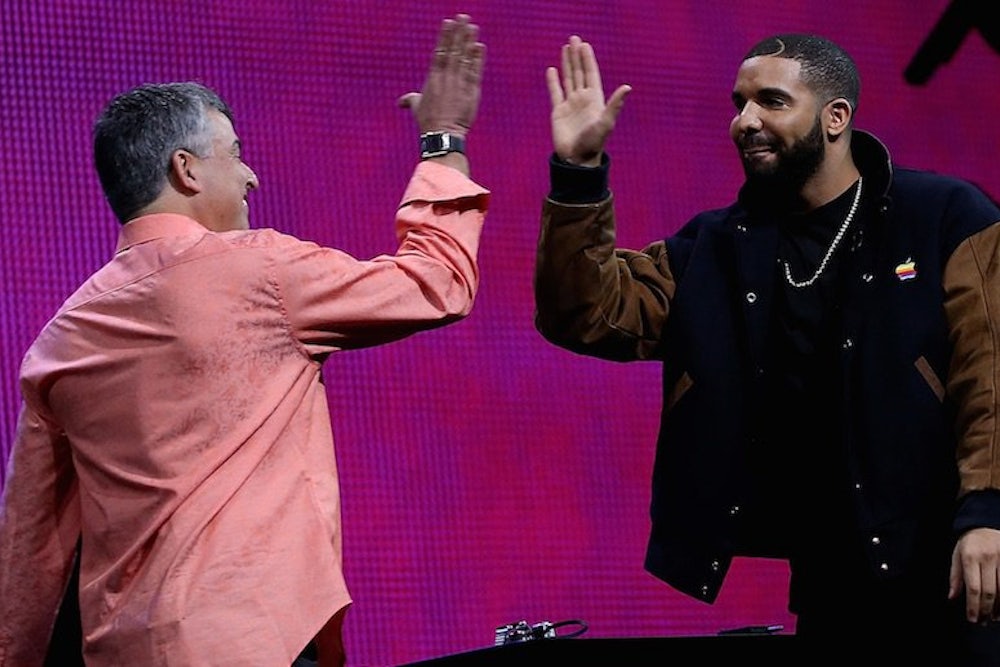On Monday, Apple closed its annual Worldwide Developer Conference with the star-studded reveal of its long-rumored music streaming service. Named Apple Music, it is a reimagined version of Apple’s billion-dollar acquisition Beats Music, and will require a monthly subscription to listen to most songs.
In the run-up to this announcement, Apple has allegedly engaged in alarming behavior. The Verge reported the Department of Justice and the Federal Trade Commission are scrutinizing the company after it pressured record labels not to renew their license agreements for YouTube and Spotify’s free streaming services. Apple hoped to cripple the offerings of other services to increase the value of its own paid service, which is likely to come pre-installed on future operating system updates.
Apple and its investors would benefit the most, of course, from disadvantaging the millions who use YouTube and Spotify’s free services. It’s another example of an alarming trend of the digital age: the dichotomization of "customer-friendly" and "consumer-friendly." Technology and internet companies, eager to please their investors, are creating singular ecosystems to maximize user interaction and monetization, rewarding customers of their systems at the expense of platform-agnostic consumers.
Perhaps the most prominent example of this practice is Amazon, which bills itself as “Earth’s most customer-centric company.” Infamously, during the 2011 holiday shopping season, the e-commerce goliath offered discounts to customers who used its price comparison app in brick-and-mortar stores. For customers, this was not necessarily convenient, but they did potentially stand to save money. At the time, Amazon only collected sales tax in five states, offering it an pricing advantage over retail stores. Last month, Amazon announced plans to launch free same-day delivery on select items for members of its Prime service in 14 markets. Accessibility—the ability to go and get something without waiting a day or two—had long remained the domain of traditional retail, but Amazon’s latest gambit could erode that.
As The New Yorker’s George Packer lamented, “Amazon is not just the ‘Everything Store’ … it’s more like the Everything.” Indeed, Amazon also provides cloud hosting services to other companies and even has a TV production arm, and now other tech companies are trying to replicate that success by expanding their interactions with customers. Facebook has spent billions on Instagram, WhatsApp, and Oculus VR. Twitter has Vine and Periscope. Apple and Google are making software for cars—and maybe even actual cars.
In these companies' push to be the fabled Everything, interoperability is waning. Weeks after Facebook announced its acquisition of Instagram, Twitter cut off access to a feature allowing users to discover people on Instagram based on their Twitter “following” list. Months later, Instagram disabled Twitter Cards integration for Instagram content. Streaming music services, as is, are unfortunately siloed—one cannot, for instance, make a universal playlist that supports Rdio, Spotify, and Apple Music. It’s a situation without an analog equivalent: mixtapes work on any brand of cassette player.
For many of these web and tech services, there are few technological obstacles preventing one service from supporting another. The only reason you can't log into Twitter with your Facebook account or can't watch the Amazon show "Transparent" on your Apple TV (without AirPlay) is that the companies see greater investment value in your dependence on their platform than the convenience of moving seamlessly between platforms.
In the coming years, being tied to an ecosystem may well carry implications beyond the mild inconvenience of not being able to stream a movie on one device. As technology companies scale their services to encompass healthcare information (everything from exercise routines to blood pressure) and integration into “smart homes,” it’s easy to imagine a future in which we grow dependent upon these ecosystems for comprehensive information about our personal and environmental wellbeing. That’s exactly the kind of customer-centric dependence that investors crave—at the expense of all of us, the consumers.
